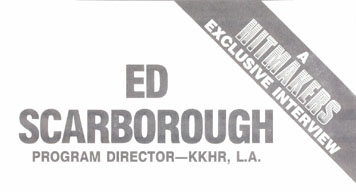|
WHERE DID YOU GO FROM WDRC? I got a job as music director for KSD in St. Louis and at the time. It was an Adult Contemporary radio station. In addition to being their full-time music director I did a weekend airshift. Then before long they moved me to middays and I continued as music director as well. THEY'RE ALL-NEWS NOW. DID YOU STAY THERE DURING THE FORMAT CHANGE AND WORK THE NEWS FORMAT? No. I was there for 3 years and the only reason I left was the sale of the station by the Pultizer people to Combined Communications, which later became absorbed by Gannett. They changed the format at that point and finding myself the music director of an all-news station, I realized it was time to move on. THAT SURE COULD BE A CLUES! THE SAME THING HAPPENED TO DICK SPRINGFIELD WHEN HE WAS AT WPOP IN HARTFORD, EXCEPT HE STAYED ON FOR QUITE A WHILE. IN YOUR CASE WHERE DID YOU GO FROM THERE? I was really fortunate. While all this was going on at KSD, KMOX-FM, the CBS owned station in St. Louis, made an offer to come across the street. So I took that and became a jock for KMOX-FM, which was at the time kind of a mellow rock format. I was hired by the regional VP and general manager of KMOX Radio, Robert Hyland, the father of Bob Hyland, our group head in New York. Robert and his program director, Bob Osborne, brought me aboard and I worked a number of shifts on KMOX-FM. When Bob left I was named PD of KMOX-FM and ultimately transformed it over to KHTR. THAT'S INTERESTING. I DIDN'T KNOW THE TWO BOB HYLAND'S WERE RELATED. Yes, the KMOX/KHTR general manager and regional VP Is Robert Hyland, Jr. and the president of the CBS FM group is Robert Hyland, III. DID YOU ASK TO BE TRANSFERRED TO LOS ANGELES OR DID CBS APPROACH YOU ABOUT GOING? They approached me. WERE YOU NERVOUS ABOUT IT? I was flabbergastedl I guess I should explain that I had wonderful years in St. Louis and being part of KHTR'S growth was really great. I remember when WLOL in Minneapolis went right through the ceiling in ratings the program director there said this should happen once in every programmer's career, where they open up the book and find themselves suddenly the #1 station in the market. When I read that I remember thinking that it sure doesn't happen all that often, when son-of-a-gun it happened in St. Louis when KHTR just exploded and became the #2 station In the market in just one book. When this offer came about asking me if I'd consider the transfer to Los Angeles, I just considered that a remarkable vote of confidence from the people that I work for. Obviously I was sad and reluctant to leave the station I considered to be "my baby," but at the same time ours is a business of challenges and I guess all of us, in the back of our minds, wonder if we're one-market flukes, so I felt I owed it to myself to give it a shot and find out. WHAT ABOUT THE LOS ANGELES MARKET? YOU ARE OBVIOUSLY REPEATING YOUR ST. LOUIS SUCCESS STORY AGAIN. IT MAY BE TAKING A LITTLE LONGER, BUT IS IT HARDER? It's a combination of a lot of things and obviously a lot different market than St. Louis. This may sound like a standard cliche, but every market is unique and that's the truth. Certain songs play in certain markets and they don't play in others and I'd say I'm still learning about what works and what doesn't work In Los Angeles. WHAT KIND OF DIFFICULTIES ARE YOU FINDING HERE THAT DIFFER FROM ST. LOUIS? First of all, the sheer size of Los Angeles. You stand on a mountain top and you see the Northwest section of the San Fernando Valley and you turn around and see the Southeast section of Orange County and you realize that’s all yours. As one engineer once put it: That’s the distance between New York and Philadelphia and you’ve got to fill it. So size is obviously a major factor. |
